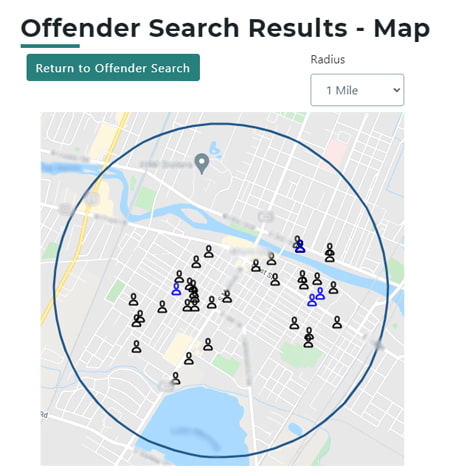






-

-
-
Maggie GeorgeRated by Super Lawyers
loading ...
Experienced Sex Crime Attorneys: What You Need to Know
Being charged with a sex crime is one of the most traumatic and damaging experiences someone can ever face. This charge alone has the potential to completely destroy someone’s reputation, career, and family, not to mention that many sexual based offenses carry the potential for lengthy prison sentences. Additionally, many sex crimes require you to register as a sex offender in the Michigan Sex Offender Registry. In other words, if you’re convicted, your name may be publically available on this registry for the rest of your life.
It’s important to note that under Michigan Law, a prosecutor simply needs an accuser’s word in order to obtain a conviction. As a result, all it takes is an over-zealous prosecutor to sentence someone who’s been accused of a sex crime to prison, jail, or public sex offender registration.
Since sexual based offenses carry harsh penalties and catastrophic social consequences, it’s important to have an experienced sex crime lawyer represent your interests when being accused of one of these crimes.
The criminal defense team at George Law is highly experienced in representing clients in cases involving sex crimes. We have the knowledge and experience to help protect both your reputation and freedom throughout this turmoil. If you or someone you know has been charged with a sex offense, contact our lawyers for a free consultation today.
Types of Sex Crimes
Criminal Sexual Conduct (CSC) – Most sexual based offenses in Michigan are referred to as criminal sexual conduct or CSC for short. There are four degrees of criminal sexual conduct. First-degree CSC is considered the most serious while fourth-degree CSC is considered the least serious. The degree by which someone can be charged for criminal sexual conduct will depend on certain details such as whether the alleged sexual act included penetration, the age of the alleged victim, the age of the alleged offender, and whether the alleged sexual act was consensual.
Sexual Assault – This is an umbrella term that covers a wide variety of different allegations. While commonly thought of in terms of a violent physical attack, it can actually include other types of less overt wrongdoing. Commonly known as “date rape”, this can be either through the use of date rape drugs to make it easier for the perpetrator to force their will upon another, or through actual physical forcing of sexual acts between two romantic partners or people who know each other.
In other situations certain types of consensual sexual activity can be considered sexual assault, the most common being statutory rape. This is when one of the participants in the sexual act is under the age of consent. In general, sexual assault cases will be classified as some degree of criminal sexual conduct, or CSC. Having allegations of CSC alone even without a conviction can do immense damage to an individual’s reputation, and a conviction can have life altering consequences.
Statutory Rape – This is a type of sex crime that occurs when there is sexual conduct or activity that occurs between one or more individuals who are under the age of consent, with another individual who is 16 years of age or older. Besides the obvious example that comes to mind of an adult having sex with a minor, this can sometimes entrap individuals who may not have nefarious intentions.
An example of this would be a 17 year old boyfriend who has consensual sex with his 15 year old girlfriend. Under Michigan law, this would be considered felony third-degree criminal sexual conduct, which can result in a prison sentence of up to 15 years. There are certain legal avenues under Michigan law to avoid this, which is why working with a expert sex crimes attorney is so critical.
Teacher Sexual Abuse – This is another typoe of sex crime that seems to be reported with increasing frequency in recent years. Teachers are especially vulnerable to allegations of criminal sexual misconduct, due to their constant proximity to children who are becoming sexually aware at increasingly younger ages. Unfortunately, sometimes this results in children crafting sexual assault allegations in order to force a teacher to do that they want, such as a passing grade in a class. This is especially common with teachers who are disliked by students. A skilled sexual assault defense attorney will be able to investigate this and protect your reputation and freedom from these allegations.
Prostitution – Simply put, prostitution involves paying another individual for sex. Prostitution is illegal for both parties, that is, for the person accepting money for sex, as well as the individual soliciting money for sex. Either of these offenses are serious and may result in incarceration as well as public sex offender registration.
Solicitation – Charges of solicitation are similar to prostitution charges. This offense is commonly referred to as “solicitation of prostitution.” The difference is that solicitation focuses on the acts leading up to sex as opposed to the act itself. For example, if someone invites a prostitute on the street into their car and discusses payment, this is considered solicitation. Solicitation of prostituion is typically a misdemeanor punishable by 90 days in jail and a $500 fine. The offender may also have to register as a sex offender.
Sex Crimes Against Minors – In today’s society, adolescents are becoming more knowledgeable about sex at an early age. In some cases, a troubled teenager or adolescent can make allegations of a sex crime against an adult for blackmail or other nefarious purposes. Stepparents, teachers, or adults with influential jobs are particularly vulnerable to false allegations. Being charged with a sex offense involving a minor is extremely damaging to someone’s reputation and can result in very harsh sentences, as a result, it’s important to have a solid team of defense lawyers when facing these allegations.
Possession of Child Sexually Abusive Material (CSAM) – The possession of child sexually abusive material or CSAM for short is the legal name given for possession of child pornography in the State of Michigan. Prosecutors almost always take these charges very seriously both at the state and federal level. When facing charges for this offense, there are many facts and circumstances that may impact the outcome of your case. For instance, was the material downloaded intentionally? Who else had access to the device containing this material? These are two of many possible questions our defense attorneys can explore.
Child Molestation – Judges and prosecutors take charges of child molestation very seriously and usually aren’t hesitant to pursue these charges to the full extent of the law. This is true even in cases where there’s little to no evidence. Being charged with a sex crime against a minor is exceptionally damaging and has the potential to completely destory someone’s career and reputation, not to mention result in lengthy prison sentences. At George Law, we represent offenders charged with all types of sex crimes and over a decade of experience as successful trial defense lawyers.
Indecent Exposure – This type of sex crime involves the exposure of an individuals private parts. This also includes the fondling of private parts without actual exposure – which is considered aggravated indecent exposure. Even those who are caught urinating in public can be charged with indecent exposure, which comes as a surprise to most. Those who are convicted of indecent exposure usually end up on the sex offender registry, which makes this charge something that needs to be taken seriously.
Michigan Sex Offender Registry

The Michigan Sex Offender Registry was created by Michigan law MCL 28.721 which is known as the Sex Offenders Registration Act (SORA). This act requires people who have been convicted of certain sex crimes report their contact information to a public database known as the Michigan Public Sex Offender Registry (PSOR). This registry contains photos of registered sex offenders as well as a publicly searchable database that can be used to look up sex offenders by name, address, registration number, or location. The registry also has a neighborhood map to show registered sex offenders within your location.
This registry and act was created with the intent of protecting children; however, it can also be used for illicit purposes such as harassing offenders listed within the registry, or in extreme cases, vigilantism and acts of violence against them.
There are many types of sex crimes that require public sex offender registration. Some of these sex offenses include: sexual abuse of a minor, kidnapping, criminal sexual conduct (CSC), sexual assault, solicitation of prostitution, indecent exposure, and more.
If you must register as a sex offender, you should know about Michigan’s three-tier system. You can find more detailed information regarding the three-tier system in Michigan’s Sex Offender Registration Act (better known as “SORA”). Tier one registrants must register for fifteen years. Tier two registrants must register for twenty-five years. Tier three registrants must register for life. This list is a public record. Therefore, anyone can access it and use what they see against you. It won’t matter that you’re trying to move on with your life or have already paid your debt to society.
Having your name publicly available in the Sex Offender Registry can have devastating consequences to both your career and social wellbeing. As a result, it’s vital to hire an experienced sex crime lawyer to help ensure your name stays off the registry. The defense attorneys at George Law have the knowledge and experience to keep your name off this registry at all costs.
What Is Unlawful Sexual Conduct?
According to Michigan law, unlawful sexual conduct is any sex-related conduct that the state deems illegal. Unlawful sexual conduct is an umbrella term for the long list of sex crimes in Michigan. Michigan’s law books divide sexual misconduct into four categories. These categories are degrees of criminal sexual conduct, often abbreviated as CSC. Michigan law breaks CSC into two classifications, “sexual penetration” and “sexual contact.” 1st and 3rd-degree criminal sexual conduct involves sexual penetration, whereas 2nd-degree criminal sexual conduct involves sexual contact.
Sexual Penetration Under Michigan Law
Michigan defines sexual penetration as “sexual intercourse, cunnilingus, fellatio, anal intercourse, or any other intrusion, however slight, of any part of a person’s body [including] any object into the genital or anal openings of another person’s body.” Michigan defines sexual contact as, “the intentional touching of the victim’s … intimate parts or the intentional touching of the clothing covering the immediate area of the victim’s … intimate parts, if [it could] reasonably be construed as being for the purpose of sexual arousal or gratification.”
Michigan Definition of Sexual Activity
Under Michigan law, sexual activity involves intimate touching, fondling, and intercourse that you do to create sexual gratification, sexual excitement, or eroticism. Oral sex, vaginal sex, anal sex, masturbation, groping, etc., are examples of sexual activity. Please be aware that caressing someone’s thigh is still considered sexual contact. If you have questions or concerns about what constitutes sexual activity, keep in mind that the courts will look into whether:
- Standard society considers it sexual
- You did it to achieve sexual stimulation
- You touched the genitals or other private area
Age of Consent Sex Laws in Michigan
Sex laws in Michigan are notably complex. For instance, the age of consent in the State of Michigan is 16 which is younger than the standard age of 18 in most other states; however, this age of consent comes with several caveats. For example, the age of consent is raised to 18 when the older party is considered an authority figure over the younger party. That is, a person under the age of 18 cannot legally consent to sex with an authority figure such as a teacher. The legal term for this relationship is a “Fiducial Relationship,” meaning that a person is in a position of power or trust over the other person allegedly giving consent for sex.
Other exceptions to the age of consent in Michigan include:
Familial Relationships – In Michigan there is currently no law against incest between two consenting adults who are 18 years old or older; however, a person who’s under the age of 18 cannot legally consent to sex with an immediate family member.
Consent under Influence – Someone who’s under the age of 18 cannot legally consent to sex while under the influence of alcohol or drugs.
Coercion – The use of force or coercion: besides physical force or the threat thereof, there is also what is called “economic coercion,” where the perpetrator obtains consent by paying the other party. In Michigan, this isn’t considered simple solicitation and can actually result in a felony charge.
Fiducial Relationship – As previously discussed, an alleged perpetrator in a position of authority over an alleged victim is considered an exception to Michigan’s age of consent. Examples of fiducial relationships may include: teachers and students, corrections officers and inmates, employers and employee’s, and other dynamics.
Rape – Regardless of the age of either party, obtaining sex through the use of force or without consent is known as rape and is illegal in each U.S. state including Michigan. Someone can be charged with rape regardless of their religious bylaws or relationship with the alleged victim.
When someone violates the age of consent, they may be charged with statutory rape or criminal sexual conduct (CSC). These charges may result in a felony conviction on someone’s criminal record as well as a prison sentence and requiring them to publicly register as a sex offender.
Trusted Michigan Criminal Sex Crime Defense Attorneys
Illicit sexual conduct crimes are more troubling than most crimes in Michigan. Local news tends to plaster the face of alleged sex criminals, even though you’re at the pre-trial stage. Unfortunately, the news of your arrest and charges can result in harsh penalties long before a trial is underway. They will likely upend your life and tarnish your reputation. A conviction only worsens matters, as employers, landlords, and even the education system may now discriminate against you. This is particularly unfortunate for someone who is rehabilitated, wrongfully convicted, or trying to return to a productive society. The conviction’s consequences are more severe when they require you to register as a sex offender for life.
You already know a sex crime is one of the worst crimes the state can bring against you. Your freedom, family, friends, and career could all be negatively impacted. Thus, it’s in your best interest to speak with a seasoned sex crime defense lawyer. The team at George Law specializes in defending people against Michigan sex crimes, and will review your charges, listen to your side of the story, and provide you with vital advice.
Guided by a thorough and well-respected litigator who has fifteen years of experience, our firm provides big firm results with a small firm personal attention. We promise to treat you with the compassion and respect you deserve despite your charges. We look forward to safeguarding your rights as we’ve done for countless others in the Wolverine State.
Do not worry. You may be in a difficult situation, but you are not in an unbeatable situation. But the best way to start defending yourself and your reputation is to consult with sex crimes attorneys who have a history of success. Take advantage of your free consultation by contacting a George Law Michigan sex crimes lawyer online or at (248) 470-4300 today. We evaluate your charges and guide you through your legal options.
Michigan Sex Crimes FAQs
Q. What is a sex crime?
This is a type of crime that occurs when an illegal sexual act takes place. There are a wide range of specific acts that are included under this, the most common of which include forced rape, statutory rape, child molestation and indecent exposure. Most of these crimes are considered felonies and the majority have mandatory jail time.
Q. Is sex offense a felony?
Most sex offenses are felonies, yes. The exceptions to this generally include other crimes which are classified as misdemeanors, including indecent exposure as well as other types of lewd conduct. First and second solicitation (prostitution) charges are also considered to be misdemeanors. That being said, even misdemeanor sex offenses should be taken seriously as they can still result in jail time and lead to an individual being listed on the Michigan Public Sex Offender Registry.
Q. What are different degrees of sex offenders?
Defined under MCL 750.520(a)(b)(c)(d), there are four degrees of sex offenses in Michigan, ranging from first to fourth degree. These carry varying incarceration sentences and penalties, the most severe being with first degree and moving down to fourth degree with the least serious punishments. All of these carry a minimum prison sentence of two years, with first degree having the potential for a life prison sentence. They also all carry with them the potential for lifetime sex offender registry, which can cause serious hardship for an individual even after they have served their sentence.
Q. What is the average sentence for sex offenders?
This varies depending on the degree of sexual misconduct in question, however there is a minimum sentence of two years regardless of the sex crime. The most common of degree of sex offense is the third degree, which includes up to 15 years in prison and a being listed on the Michigan Public Sex Offenders Registry for the rest of their life.
Q. When is a sex crime a misdemeanor v.s. Felony?
Most sex offenses are felonies, due to their heinous nature. However some are considered misdemeanors. Generally speaking, unless it is indecent exposure or first/second offense solicitation, it is considered a felony offense. Regardless of whether an offense is a misdemeanor or felony, it should be taken seriously as it can result in incarceration as well as being placed on the public sex offenders registry.
Criminal Defense Practice Areas
- Criminal Defense
- Sex Crimes
- Drug Charges
- Misdemeanor Offenses
- Domestic Violence
- Michigan Gun Law & Firearm Laws
- Rules for Transporting Firearms in Michigan
- Manufacture, Sale, Or Possession Of Illegal Weapons
- Carrying A Firearm Or Weapon With Unlawful Intent – MCL 750.226
- Possession Of A Firearm By A Felon In Michigan – MCL Section 750.224f
- Carrying Certain Concealed Weapons In Michigan – MCL Section 750.227
- Possession Of A Firearm During A Felony – MCL 750.227b
- Pointing Or Aiming A Firearm At Another Person – MCL 750.233
- Unlawful Firearm Transportation – MCL Section 750.227d
- Discharging A Firearm Without Malice – MCL Section 750.234
- Possession Of Short-Barreled Shotgun Or Rifle – MCL 750.224b
- Altering, Removing Identifying Marks On Firearms
- Discharging A Firearm In A Home Or Occupied Structure
- Homicide
- Juvenile Offenses
- Criminal Record Expungements in Michigan
- School Offenses
- White Collar Crime
- Violent Crimes
- Embezzlement
- Theft Crimes
- Michigan Felony Defense Lawyers
- Internet Crime / Cyber Crime
- Federal Crimes
- Probation Violations
- Traffic
- The Criminal Process in Michigan
Contact Details
Contact Us
Office Locations
- OFFICE ADDRESS
444 South Washington Avenue
Royal Oak, MI 48067
248-470-4300 - AVAILABLE 24/7
Call/Text My Cell: 248-470-4300
Fax: 248-381-8894
FREE Case Evaluation
To talk to an attorney today, call 248-470-4300,
or fill out our contact form

 Menu
Menu